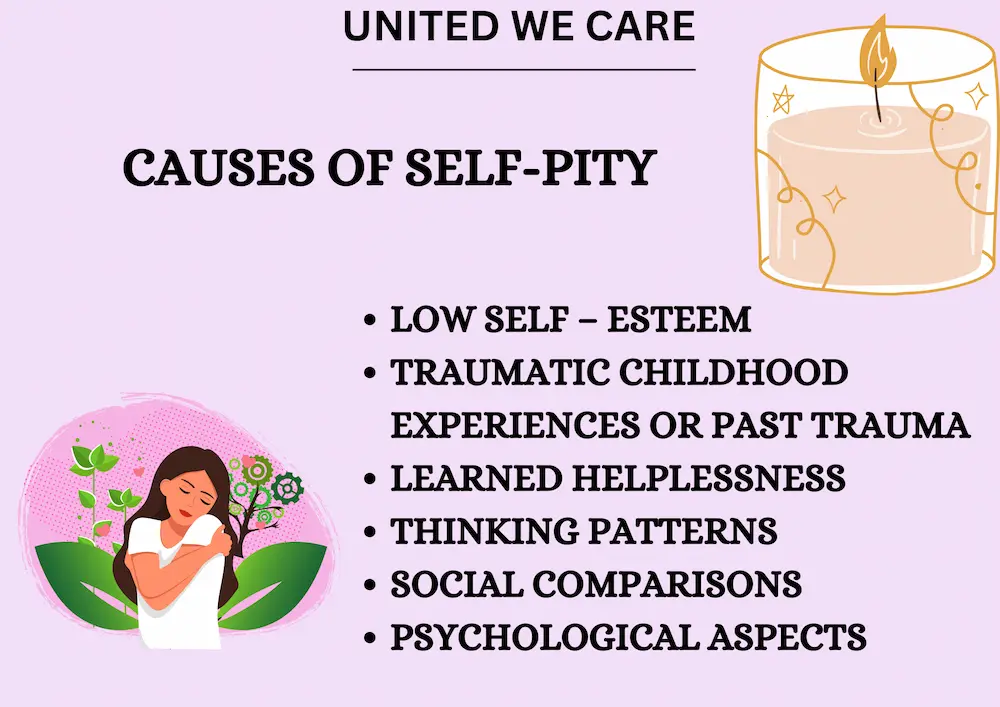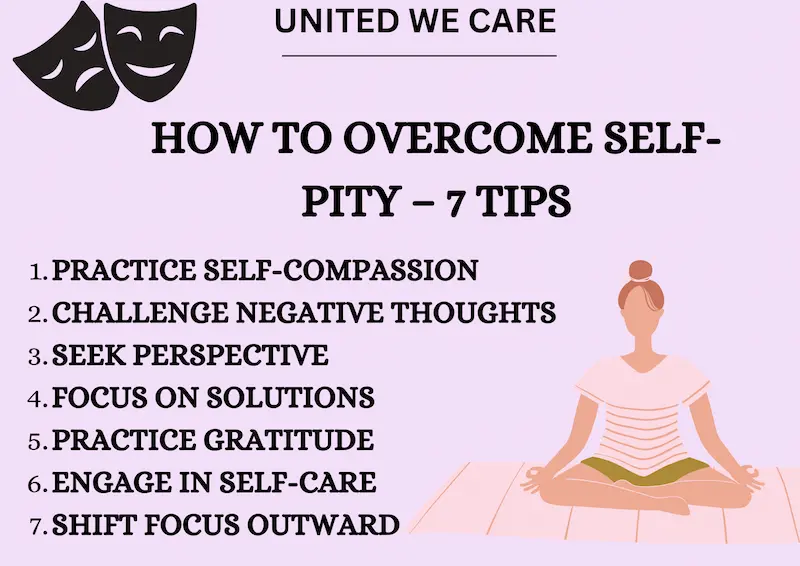Introduction
Have you ever found yourself in a situation where you received a lower grade than expected on an important exam? Instead of immediately focusing on how to improve for the next opportunity, did you catch yourself dwelling on the perceived failure? This scenario illustrates a common experience of self-pity. It’s when we become fixated on negative emotions and setbacks, often hindering our ability to take constructive action toward improvement. Rather than proactively seeking solutions, we remain trapped in a cycle of self-doubt and demotivation, which can impede our progress and growth.
What is Self-Pity?
Self-pity is an emotion characterized by feelings of sadness, worthlessness, and a sense of victimhood directed toward oneself. When someone engages in self-pity, they tend to focus on their own perceived misfortunes or difficulties without seeking constructive solutions or taking responsibility for their situation.
From a psychological perspective, self-pity can be understood as a defense mechanism, when we engage in self-pity we often create a cycle of negativity and self-perpetuating thoughts of inadequacy which then helps us cope from the negative situation.
While it’s natural to experience moments of self-pity occasionally, prolonged self-pity can hamper one’s personal growth and resilience. Persistent rumination which occurs when we engage in self-pity often creates mind blocks that does not allow us to see the situation from another lens. Self-pity often looks like excessive feelings of hopelessness, intensifies fixation on negative experiences, and an overall pessimistic worldview.
Symptoms of Self-Pity
Some of the common symptoms of self-pity include:
- An excessive focus on one’s personal problems, failure, and difficulties without considering the alternative view of a situation.
- Feelings as though one has been treated unfairly by all leading to a sense of helplessness or powerlessness.
- Engaging in a downward comparison to make oneself feel like other’s have it better which may increase feelings of jealousy, envy or resentment.
- Placing more importance on external circumstances rather than taking responsibility for one’s own actions or seeking new ways of coping.
- Withdrawing from social interactions or avoiding them as a way to cope with the loss or personal problem.
- Adopting a self-critical thinking pattern about oneself, like “I’m a failure,” “I’ll never succeed,” or “Nothing ever goes right for me.”
- Not being action-oriented in situations and focusing on feelings of sadness, anger, and self-pity, often without clear triggers or resolution.
- Some may even experience stress-related physical symptoms such as fatigue, headaches, or digestive issues due to chronic emotional distress.
- Being reluctant or rigid in one’s own thoughts that nobody can understand or help, or due to feelings of unworthiness.
- Not willing to seek help from a professional to help break out of the cycle of self pity despite it causing problems in day to day functioning.
Causes of Self-Pity
Self-pity is a phenomenon that does not happen overnight; it is a slow process that develops into a habit. It can originate from a complex interplay of many psychological factors, which are given below :

- Low Self–Esteem – Self-esteem plays a huge role in how we view ourselves. When an individual views themselves less favorably as compared to others, they are more often susceptible to engaging in self-pity cycles. Low self-esteem increases feelings of inadequacy and worthlessness, which perpetuates self-pity.
- Traumatic childhood Experiences Or Past Trauma – As a child, we learn to make sense of the world from a young age based on our experiences. Having exposure to adversity or traumatic experiences increases an individual’s feelings of powerlessness in times of uncertainty as well as their ability to cope with stressors.
- Learned Helplessness – When we experience repeated failures or hardships our ability or motivation to change also reduces. Self-pity often occurs when an individual feels as though the situation is unchangeable and loses motivation to change the mindset thereby feeling as though being helpless is the only option left.
- Thinking Patterns – Cognitive bias in our thought patterns often increase self-pity as we often tend to focus on only the situation that have negativity impacted us or engage in negative self-attribution to reinforce self-pitying behaviors.
- Social Comparisons – We often only understand ourselves in reference to others, however if we excessively compare ourselves to others, we reinforce the cycle to self-pity as we tend to see ourselves in a more negative light or focuses more on the losses than gains.
- Other psychological aspects like access to resources, education, growth opportunities, etc., interact with environmental stressors, social comparisons, and cultural influences, shaping the individual’s perception of their own suffering and the extent to which they internalize it.
How Does Self-Pity Destroy Self-Confidence?
Continuously dwelling on personal setbacks can create a distorted view of one’s abilities and undermine belief in oneself and reduce self-confidence.
- Self-pity tends to foster a victim mentality, where individuals perceive themselves as helpless recipients of external circumstances. This mindset diminishes feelings of agency and control, leading to a loss of confidence in one’s ability to overcome challenges or achieve goals.
- Self-pity can sabotage efforts to seek constructive solutions or take proactive steps toward self-improvement. Instead of engaging in productive behaviors, individuals may become immobilized by their negative emotions, further exacerbating feelings of incompetence and inadequacy.
- Prolonged engagement in self-pity can lead to a cycle of self-reinforcing negative thoughts and emotions, creating a self-perpetuating pattern of low self-esteem and diminished self-confidence.
- Self-pity often leads to avoidance of challenges or opportunities for growth. Instead of confronting difficulties head-on, individuals may retreat from situations that could boost their confidence, perpetuating a cycle of avoidance and further undermining self-esteem.
How To Overcome Self-Pity – 7 Tips

- Practice Self-Compassion: Treating oneself with kindness goes a long way. When we try to understand ourselves, just as you would to a friend, we are able to be more compassionate in our approach. Acknowledging and validating that your feelings are valid without judgment and reminding yourself that it’s okay to struggle sometimes helps in reducing self-pity.
- Challenge Negative Thoughts: Recognize and challenge negative self-talk that fuels self-pity. Replacing self-critical thoughts or narratives with more realistic and compassionate ones can reduce the burden of the feeling of inadequacy.
- Seek Perspective: Taking a step back and zooming out of a particular situation can help broaden perspective. Sometimes, we tend to view situations from a myopic view and react in similar ways. Asking oneself if the reaction is proportional to the situation at hand can help adopt a more realistic way of dealing with pity.
- Focus on Solutions: Shifting the focus to finding novel solutions. Breaking down larger challenges into manageable steps and taking more proactive action towards addressing challenge itself. Making goals to overcome challenges provides a more tangible way of dealing with situations.
- Practice Gratitude: Cultivating a mindset of gratitude by focusing on the positive aspects of a situation. We often forget the good when we feel the bad, and practicing gratitude can help break the negative feedback loops. Regularly reflect on things you’re thankful for, no matter how small. This can help shift your attention away from self-pity towards appreciation and resilience.
- Engage in Self-Care: Prioritizing one’s self-care activities that include a more holistic approach which focus on physical, emotional, and mental well-being. This may include exercise, relaxation techniques, spending time with loved ones, pursuing hobbies, or seeking professional support if needed.
- Shift Focus Outward: We often tend to focus on things which may lie beyond our control, if we focus on things outwards, like those which we have more power over rather than those which we don’t we can gain a greater sense of control in situations.
By incorporating these strategies into your daily life, you can gradually overcome \self-pity and cultivate a more resilient and empowered mindset.
Conclusion
In conclusion, fixating on negative emotions regarding a particular situation is natural; however, when done excessively only focusing on the negative aspects and adopting a victim stance leads to self-pity. Engaging in frequent self-pitying behavior leads to low self-esteem, increased feelings of unfulfillment, and poor well-being. It is important to break out of the cycle of negative thoughts to increase self-confidence and take on the challenges that life has to offer. By being compassionate and kind to oneself, self-pity can drastically reduce as we allow the situation to be perceived in different ways. Understanding what lies within the circle of control and circle out of control, we can shift the view and broaden our focus on regaining some control and purpose in different scenarios. By engaging in these ways, we can decrease our feelings of inadequacy and adopt a more holistic view, which further increases confidence in facing challenges and builds resilience.
Reference:
- Heider F. (1958). The psychology of interpersonal relations. New York, NY: Wiley.
- Stöber J. Self-pity: exploring the links to personality, control beliefs, and anger. J Pers. 2003 Apr;71(2):183-220. doi: 10.1111/1467-6494.7102004. PMID: 12693515.
- Social psychology, 11th ed. Citation. Baron, R. A., Byrne, D., & Branscombe, N. R. (2006). Social psychology (11th ed.). Pearson Education.
- Parkinson, B., & Manstead, A. S. R. (2015). Current Emotion Research in Social Psychology: Thinking About Emotions and Other People. Emotion Review, 7(4), 371-380. https://doi.org/10.1177/1754073915590624
- Weiner, B. (2014). The Attribution Approach to Emotion and Motivation: History, Hypotheses, Home Runs, Headaches/Heartaches. Emotion Review, 6(4), 353-361.
- Oatley, K. (2010). Two Movements in Emotions: Communication and Reflection. Emotion Review, 2(1), 29-35.










